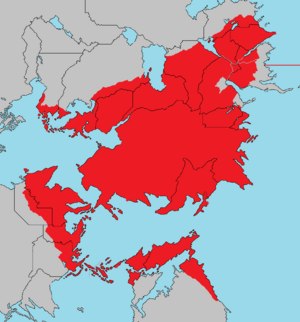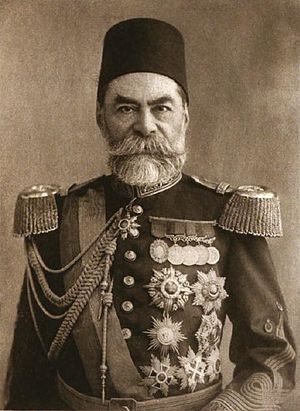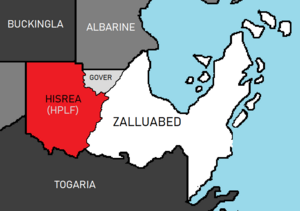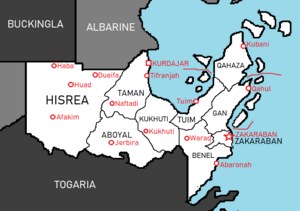Zalluabed: Difference between revisions
No edit summary |
|||
| (30 intermediate revisions by 3 users not shown) | |||
| Line 7: | Line 7: | ||
|national_motto = | |national_motto = | ||
|national_anthem = | |national_anthem = | ||
|image_map = | |image_map = Zalluabed_three_countries_2024.png | ||
|alt_map = | |alt_map = | ||
|map_caption = | |map_caption = | ||
| Line 23: | Line 23: | ||
|leader_name1 = [[Farik al-Jamura]] | |leader_name1 = [[Farik al-Jamura]] | ||
|leader_title2 = [[President of Zalluabed|President]] | |leader_title2 = [[President of Zalluabed|President]] | ||
|leader_name2 = [[ | |leader_name2 = [[Husani Antar]] | ||
|leader_title3 = [[Foreign Minister of Zalluabed|Foreign Minister]] | |leader_title3 = [[Foreign Minister of Zalluabed|Foreign Minister]] | ||
|leader_name3 = [[Nashat el-Yusuf]] | |leader_name3 = [[Nashat el-Yusuf]] | ||
| Line 46: | Line 46: | ||
|area_label2 = <!-- label below area_label (optional) --> | |area_label2 = <!-- label below area_label (optional) --> | ||
|area_dabodyalign = <!-- text after area_label2 (optional) --> | |area_dabodyalign = <!-- text after area_label2 (optional) --> | ||
|population_estimate = | |population_estimate = 31,588,000 | ||
|population_estimate_rank = | |population_estimate_rank = | ||
|population_estimate_year = 2020 | |population_estimate_year = 2020 | ||
| Line 94: | Line 94: | ||
}} | }} | ||
The '''Kingdom of Zalluabed''', most commonly known as '''Zalluabed''', is a nation | The '''Kingdom of Zalluabed''', most commonly known as '''Zalluabed''', is a nation located on the continent of [[Adula]], bordered by [[Albarine]], [[Anyuaa]], [[Buckingla]], [[Hisrea]], [[Togaria]], and [[Unified Sera]]. The country has a semi-arid geography, with most of the population of 31.6 million living in the fertile coastal regions, and sparsely populated desert mountains dominating the geography of the west. This arid geography makes the country very vulnerable to climate change. The capital and largest city, [[Zakaraban]], is located in the east along the coast of the [[Emmiria Sea]], and contains nearly 40% of the nation's population. Prior to the separation of Anyuaa and Hisrea, its major cities include [[Kurdajar]], [[Tuim]], [[Qahul]], [[Huad]], and [[Waraq]]. | ||
Zalluabed has a long history of human settlement and civilization, with prominence as a coastal trading post for the [[Toyana Ocean]] as parts of the [[Quetana]]n and [[Emmiria]]n empires. In the modern era, it has been known for major economic strides with the discovery of major oil fields, but its become known for political and social strife. In the [[World War (Iearth)|World War]], Zalluabed provided supplies to the League Powers. It joined the CCA in the 1990s, but has been repeatedly criticized for aggressive tactics in insuring its sovereign territorial claims. Recent events, like the [[Tarijar Strait Crisis]] and the [[Hisrea War]], have drawn scrutiny | Zalluabed has a long history of human settlement and civilization, with prominence as a coastal trading post for the [[Toyana Ocean]] as parts of the [[Quetana]]n and [[Emmiria]]n empires. In the modern era, it has been known for major economic strides with the discovery of major oil fields, but its become known for political and social strife. In the [[World War (Iearth)|World War]], Zalluabed provided supplies to the League Powers. It joined the CCA in the 1990s, but has been repeatedly criticized for aggressive tactics in insuring its sovereign territorial claims and pursuing a nuclear program which was the subject of international sanctions. Recent events, like the [[Tarijar Strait Crisis]] and the [[Hisrea War]], have also drawn scrutiny. The presidency of [[Zayyaan al-Akhtar]] was considered by the international community as being an authoritarian government, but the 2023 general election installed a more liberal-leaning government headed by [[Husani Antar]]. Antar's progressive policies and intention to leave the [[Trans-Toyana Prosper Alliance|TTPA]] prompted the military to [[2023 Zalluabed coup|oust him in a coup]] under [[Saahir Salim]], and a [[Zalluabed civil war]] broke out as a result. In July 2024, a peace deal settled fighting between Antar supporters and the government and resulted in the independence of [[Anyuaa]]. | ||
Zalluabed has a semi-presidential constitutional monarchy, with local constituencies consisting of 38 provinces and 941 communes. Zalluabed is a regional and middle power. It has one of the highest of Human Development Index of all Southern [[Adula]]n countries and one of the largest economies on the region of the continent, based largely on energy exports. Zalluabed has the 16th largest oil reserves in the world and the tenth largest in Adula, while it has the eleventh-largest reserves of natural gas. [[Zonatrach]], the national oil company, is one of the largest companies in Adula, supplying large amounts of natural gas to [[Euronia]]n nations, specifically [[Drambenburg]] and [[Murzi]]. Zalluabed is a member of the [[Coalition of Crown Albatross]], [[Trans-Toyana Prosper Alliance|TTPA]], [[Coalition Trade Organization|CTO]], and many other international organizations. | |||
==History== | ==History== | ||
===Prehistory=== | ===Prehistory=== | ||
=== | Human habitation of Zalluabed dates back to 50,000 years ago. Settlements and tools dating back to the Stone Age have been unearthed in the region. Artifacts originating from the Abaid period (c. 6500–3800 BC) have been discovered in abandoned coastal settlements. Al Ka'asa, a settlement located on the eastern coast, is the most important Abaid site in the country and is believed to have accommodated a small seasonal encampment. | ||
===Antiquity=== | |||
The Achaiminid Empire (550–330 BC), founded by [[Cryun the Great]], was the first true global superpower state and it ruled from as far north as [[Raviannas]] and as far south as [[Semalia]], from their seat of power in [[Hazarabad]] (at the time known as Cryunias). The Achaiminid Empire conquered eastern Zalluabed in 402 BC, but within 50 years, it was pushed out of the country by unrest and rebellion. | |||
===Emmirian Empire=== | |||
[[File:EmmirianEmpireAtHeightin980AD.png|thumb|right|The Emmirian Empire at its height in 980 AD]] | |||
Zalluabed was described as a famous horse and camel breeding center during the Emayyad period. In the 8th century, it started benefiting from its commercially strategic position in the [[Emmiria Sea]] and went on to become a center of pearl trading. It became part of the Emmirian Empire in 820, at which point Islam spread to the region. Zalluabed was divided into caliphates, but as the Empire declined, so did the development of Zalluabed. | |||
===Modern Age=== | ===Modern Age=== | ||
====18th Century==== | |||
The [[House of Jamura|Al-Jamura dynasty]] was established with the ascension of [[Monarchy of Zalluabed|King]] [[Jayaba al-Jamura]] in 1783. | |||
====19th Century==== | |||
Zalluabed saw fighting in the [[Barretoan Wars]], when [[Timeria]]n and [[Durnstaal]] fleets engaged with [[Skith]]an forces off its coast. | |||
====20th Century==== | ====20th Century==== | ||
[[File:North_Yemen_Civil_War.jpg|thumb|right|Zalluabedi forces in the [[1959-60 Togaria War]]]] | |||
Oil reserves were first discovered in Zalluabed in 1929. Oil exports began in 1941, and oil revenues became the country's main source of revenue, the pearl trade having gone into decline. These revenues were used to fund the expansion and modernization of Zalluabed's infrastructure. [[Zonatrach]], the country's main oil and gas company, was founded in 1963. | |||
[[File:Mukhtar_Pasha.jpg|thumb|left|[[Monarchy of Zalluabed|King]] [[Malik al-Jamura]], 1932]] | |||
[[Monarchy of Zalluabed|King]] [[Malik al-Jamura]] took the throne in 1932. Zalluabed's regime under King Malik al-Jamura supplied the League Powers of [[Drambenburg]], [[Egilanak]], and [[Styrae]] during the [[World War (Iearth)|World War]], and it was regarded as a tyrannical regime due to extrajudicial killings of political opponents and suspected international spies. King Malik often rallied the nation in nationalist attitudes against neighboring countries, specifically the secularized state of [[Albarine]] to the north and the formerly Islamic nation of [[Togaria]] to the south. Malik [[1959-60 Togaria War|launched an invasion into Togaria]] to attempt and install a puppet government. However, Zalluabedi forces were repelled. The two-week long [[1963 Ascacia War]] broke out in May of 1963 when King Malik tried to lay claim to off-shore oil fields, and the conflict drew international scrutiny. | |||
King Malik died in 1966, and his son [[Isa al-Jamura]] became king. Isa led reforms, breaking up much of his father's authoritarian policies, and embracing a more liberal form of Islam. In 1980, he reformed the political process by instituting the [[National Assembly of Zalluabed|National Assembly]] and the position of [[President of Zalluabed]]. Within the decade, the political power held by the King would essentially dissipate to a symbolic role. Furthermore, diplomatic reforms were made with Zalluabed drawing closer to the nations of [[Beleroskov]], Drambenburg, and [[Yuan]]. King Isa backed the formation of the [[Coalition of Crown Albatross]], and joined the organization with approval of the National Assembly in 1981. | |||
[[Bariim al-Kaboula]] was elected President in 1997. On 6 March 1999, [[Farik al-Jamura]] became king when Isa died in a car crash while visiting [[Rhaga]], [[Emmiria]]. | |||
====21st Century==== | ====21st Century==== | ||
In October of 2000, a Shia insurgency in Zalluabed began when dissident cleric [[Hussein al-Athi]], head of the Hisrean Shia sect, launched an uprising against the government. The government alleged that the Hisrean rebels, known as the [[Hisrea People's Liberation Front]] (HPLF), were seeking to overthrow it and to implement Shī'ite religious law. The rebels counter that they are "defending their community against discrimination" and government aggression. The revolution was put down. | |||
On November 25th, 2020, [[Albarine]] was at the center of the [[Tarijar Strait Crisis]], which arose after [[Drambenburg]] was granted access to build military bases in [[Buckingla]] and Zalluabed. Against the move, which Albarine saw as an affront to the safety of international shipping in the waterway (which was required for Drambenburgian naval warships to traverse to Buckingla), Albarine condemned all three nations with the backing of [[Emmiria]]. Zalluabed, in response, closed their embassy and consulate in Albarine and sent a naval detachment to the outskirts of Albarine territorial waters as a show of force. Ultimately, threat of [[Coalition of Crown Albatross]] intervention and condemnation forced Zalluabed's navy to stand down. | |||
[[Abdelaziz Melkabaar]] was elected President in 2009. | |||
[[Zayyaan al-Akhtar]] was elected President in 2017. | |||
On November 25th, 2020, [[Albarine]] was at the center of the [[Tarijar Strait Crisis]], which arose after [[Drambenburg]] was granted access to build military bases in [[Buckingla]] and Zalluabed. Against the move, which Albarine saw as an affront to the safety of international shipping in the waterway (which was required for Drambenburgian naval warships to traverse to Buckingla), Albarine condemned all three nations with the backing of [[Emmiria]]. Zalluabed, in response, closed their embassy and consulate in Albarine and sent a naval detachment to the outskirts of Albarine territorial waters as a show of force. Ultimately, threat of [[Coalition of Crown Albatross]] intervention and condemnation forced Zalluabed's navy to stand down. In December of 2020, the [[Hisrea People's Liberation Front]] (HPLF) seized many key towns and villages in the province of Hisrea, sparking [[President of Zalluabed|President]] [[Zayyaan al-Akhtar]]'s decision to send government forces into the province to combat them, beginning the [[Hisrea War]]. After the capture of Habu Daa on December 30th, the [[Zalluabed Army]] began major operations to clear the HPLF, which started resulting in major loss of civilian life. | |||
[[File:HisreaWarJuly2021Territory.png|thumb|right|Territory held by the HPLF (red) in July of 2021]] | [[File:HisreaWarJuly2021Territory.png|thumb|right|Territory held by the HPLF (red) in July of 2021]] | ||
In | In January 2021, Hisrea Province's First Minister Aikan Ayadmar of the Hisrea Nationalist Party (HNP) pledged to push through with a referendum on independence, regardless of whether he won election against al-Akhtar. President al-Akhtar was reelected to a second term in February of 2021, but despite his domestic popularity, international scrutiny surrounding the offensive ramped up, with [[Zamastan]]ian [[Secretary of State (Zamastan)|Secretary of State]] [[Jessiah Vallotis]] calling it "a genocide in the making." After a Security Council resolution, Zalluabed government forces withdrew from Hisrea on April 19th, 2021. However, the HPLF rebounded and seized much of the province once again, and after an unsuccessful assassination attempt on President al-Akhtar by the HPLF, Zalluabedi forces with the backing of [[Beleroskov]], [[Buckingla]], and [[Kossmil]] began a new operation to push them back. Again facing international scrutiny, [[Drambenburg]]ian observers were sent to mediate the conflict and ensure practical military conduct. | ||
On July 15th, a Zalluabedi fighter jet accidentally fired on a [[Zamastanian Naval Forces|Zamastanian naval vessel]], the [[ZMS Monserrati]], killing 21 sailors and drawing heavy scrutiny from the international community. On July 21st, [[Huad]] was captured by government forces, but the conflict began to stall. Four days later on the 25th, a string of suicide bombings committed by the HPLF struck [[Zakaraban]], killing more than 80 people and causing damage to many international embassies. On August 8th, the government and the HPLF accepted an invitation by [[Timeria]]n President [[Aneya Raso]] to a peace conference in [[Osea]], where on August 13th they agreed to a power-sharing agreement, ending the conflict and separating Zalluabed into two distinct governed zones in the [[Osea Accords]]. Hisrea became largely autonomous as a result, and the Zalluabedi government leaned closer into reconciliation with the international community. | |||
The presidency of Zayyaan al-Akhtar was considered by the international community as being an authoritarian government, but the 2023 general election installed a more liberal-leaning government headed by [[Husani Antar]]. Antar's progressive policies impressed much of the international community, as he became the first Zalluabedi head of state to visit Albarine, speak at the CCA General Assembly, and reopen diplomacy with Zamastan. However, Antar's intention to leave the [[Trans-Toyana Prosper Alliance|TTPA]] prompted the military to [[2023 Zalluabed coup|oust him in a coup]] under General [[Saahir Salim]], and a [[2023 Zalluabed conflict|civil war]] broke out as a result. Salim and several other officials were assassinated in October 2023 as fighting intensified. As of mid 2024, the civil war is still ongoing with several factions, though an internationally-mandated ceasefire between the main belligerents and a CCA peacekeeping operation are in place. | |||
==Geography== | ==Geography== | ||
| Line 124: | Line 151: | ||
==Demographics== | ==Demographics== | ||
===Religion=== | ===Religion=== | ||
[[File:Cour_mosquee_Suleymaniye_Istanbul.jpg|thumb|left|The Grand Zakana Mosque in [[Kurdajar]]]] | |||
Zalluabed is a predominantly Sunni Muslim country with Islam as its state religion. The percentage of adherents of various religions is a controversial topic in Zalluabed. An estimated 85–90% are identified as Muslim, 10–15% as Coptic Christians, and 1% as other Christian denominations, although without a census the numbers cannot be known. Other estimates put the Christian population as high as 15–20%. Non-denominational Muslims form roughly 12% of the population. | |||
Zalluabed was a Christian country before the 7th century, and after Islam arrived, the country was gradually Islamised into a majority-Muslim country. It is not known when Muslims reached a majority variously estimated from c. 1000 CE to as late as the 14th century. Zalluabed emerged as a center of politics and culture in the Muslim world. | |||
There is also a Shi'a minority, with more than 92% of Shi'as in the country living in Hisrea province. | |||
===Language=== | ===Language=== | ||
===Cities=== | ===Cities=== | ||
{|class="wikitable" style="text-align:center" | |||
|- | |||
|colspan=6| | |||
'''Metropolitan areas in Zalluabed | |||
|- | |||
|No. | |||
|CMA<br>{{small|City}} | |||
|colspan=2|Population | |||
|- | |||
|style="background-color:grey; color:white;"|1 | |||
|'''[[Zakaraban]]''' | |||
|2,915,811 | |||
|- | |||
|style="background-color:grey; color:white;"|2 | |||
|'''[[Kurdajar]]''' | |||
|1,315,100 | |||
|- | |||
|style="background-color:grey; color:white;"|3 | |||
|'''[[Qahul]]''' | |||
|821,000 | |||
|- | |||
|style="background-color:grey; color:white;"|4 | |||
|'''[[Tuim]]''' | |||
|631,500 | |||
|- | |||
|style="background-color:grey; color:white;"|5 | |||
|'''[[Huad]]''' | |||
|312,730 | |||
|- | |||
|style="background-color:grey; color:white;"|6 | |||
|'''[[Waraq]]''' | |||
|287,155 | |||
|- | |||
|style="background-color:grey; color:white;"|7 | |||
|'''[[Kubani]]''' | |||
|214,260 | |||
|- | |||
|style="background-color:grey; color:white;"|8 | |||
|'''[[Afakim]]''' | |||
|178,000 | |||
|- | |||
|style="background-color:grey; color:white;"|9 | |||
|'''[[Abaronah]]''' | |||
|153,800 | |||
|- | |||
|style="background-color:grey; color:white;"|10 | |||
|'''[[Naftadi]]''' | |||
|102,637 | |||
|- | |||
|} | |||
==Politics== | ==Politics== | ||
Zalluabed is a constitutional monarchy headed by the King, [[Farik al-Jamura]]. King Jamura enjoys wide executive powers which include appointing the [[President of Zalluabed]] and his ministers, commanding the army, chairing the Higher Judicial Council, appointing the parliament's upper house and dissolving its elected lower house. The head of government is the President | Zalluabed is a constitutional monarchy headed by the King, [[Farik al-Jamura]]. King Jamura enjoys wide executive powers which include appointing the [[President of Zalluabed]] and his ministers, commanding the army, chairing the Higher Judicial Council, appointing the parliament's upper house and dissolving its elected lower house. The head of government is the President, currently vacant since the [[2023 Zalluabed coup]], the ouster of [[Husani Antar]], and the assassinations of the coup masterminds [[Saahir Salim]] and [[Zayyaan al-Akhtar]]. | ||
Zalluabed has a bicameral [[National Assembly of Zalluabed|National Assembly]] consisting of the Zhura Council with 40 seats and the Council of Representatives with 40 seats. The forty members of the Zhura are appointed by the king. In the Council of Representatives, 40 members are elected by absolute majority vote in single-member constituencies to serve four-year terms. The appointed council "exercises a de facto veto" over the elected, because draft acts must be approved so they may pass into law. After approval, the king may ratify and issue the act or return it within six months to the National Assembly where it may only pass into law if approved by two thirds of both councils. | Zalluabed has a bicameral [[National Assembly of Zalluabed|National Assembly]] consisting of the Zhura Council with 40 seats and the Council of Representatives with 40 seats. The forty members of the Zhura are appointed by the king. In the Council of Representatives, 40 members are elected by absolute majority vote in single-member constituencies to serve four-year terms. The appointed council "exercises a de facto veto" over the elected, because draft acts must be approved so they may pass into law. After approval, the king may ratify and issue the act or return it within six months to the National Assembly where it may only pass into law if approved by two thirds of both councils. | ||
| Line 134: | Line 218: | ||
===Provinces=== | ===Provinces=== | ||
[[File:ZalluabedProvincesandCities.png|thumb|right|The provinces and major cities of Zalluabed]] | [[File:ZalluabedProvincesandCities.png|thumb|right|The provinces and major cities of Zalluabed]] | ||
Zalluabed consists of 9 provinces. | |||
*[[Zakaraban]] | |||
*Benel | |||
*Gan | |||
*Tuim | |||
*Qahaza | |||
*Kukhuti | |||
*Taman | |||
*Aboyal | |||
*Hisrea | |||
===Military and Foreign Relations=== | ===Military and Foreign Relations=== | ||
[[File:Saudi Navy Desert Sheild.JPEG|thumbnail|250px|right|King Aziz Naval Base in [[Zakaraban]], home to the fleet of the [[Royal Zalluabed Navy]] and the Drambenburg Naval Dispatch]] | [[File:Saudi Navy Desert Sheild.JPEG|thumbnail|250px|right|King Aziz Naval Base in [[Zakaraban]], home to the fleet of the [[Royal Zalluabed Navy]] and the Drambenburg Naval Dispatch]] | ||
The kingdom has a moderate but well equipped military called the [[Zalluabed | The kingdom has a moderate but well equipped military called the [[Royal Zalluabed Defense Forces]] (RZDF), numbering around 243,000 personnel. The RZDF consists of five branches; the [[Royal Zalluabed Army]], the [[Royal Zalluabed Navy]], the [[Royal Zalluabed Air Force]], the [[Royal Zalluabed Marine Force]], and the [[Royal Zalluabed Police Force]]. The supreme commander of the military is King al-Jamura and the deputy supreme commander is the Crown Prince, Hamad al-Jamura. The RZDF is primarily equipped with domestically built equipment, such as the [[IL5-Nightjar]] and [[IL9-Ibis]], though in recent years they have procured [[Drambenburg]]ian equipment. | ||
Zalluabed is a member of the [[Coalition of Crown Albatross]], and has established bilateral relations with 89 countries worldwide. As of 2012, Zalluabed maintains a network of 25 embassies and 3 consulates. It's closest allies are [[Buckingla]] and [[Drambenburg]], the latter of which holds significant military presence within the country. Drambenburg holds military leases at two airports (one of which is at the capital of [[Zakaraban]]), and a naval base in the port of Zakaraban. During the [[Hisrea War]], the foreign intervention of Drambenburg, Beleroskov, [[Kossmil]], and Buckingla were important factors. | Zalluabed is a member of the [[Coalition of Crown Albatross]], and has established bilateral relations with 89 countries worldwide. As of 2012, Zalluabed maintains a network of 25 embassies and 3 consulates. It's closest allies are [[Buckingla]] and [[Drambenburg]], the latter of which holds significant military presence within the country. Drambenburg holds military leases at two airports (one of which is at the capital of [[Zakaraban]]), and a naval base in the port of Zakaraban. During the [[Hisrea War]], the foreign intervention of Drambenburg, Beleroskov, [[Kossmil]], and Buckingla were important factors. Likewise, the military-government established after the [[2023 Zalluabed coup]] relied heavily on [[Trans-Toyana Prosper Alliance|TTPA coalition support]] in the [[2023 Zalluabed conflict|ensuing civil war]]. | ||
===Human Rights=== | ===Human Rights=== | ||
Zalluabed is often criticized for its human rights record, having very little freedom of religion and limits on freedom of the press. The [[Coalition of Crown Albatross|CCA-Human Rights Watch]] has placed Zalluabed on its watch list of countries that require close monitoring due to the nature and extent of violations of religious freedom engaged in or tolerated by the government. According to a 2010 survey, 84% of Zalluabedis polled supported the death penalty for those who leave Islam; 77% supported whippings and cutting off of hands for theft and robbery; and 82% support stoning a person who commits adultery. | |||
Christians face discrimination at multiple levels of the government, ranging from underrepresentation in government ministries to laws that limit their ability to build or repair churches. Intolerance towards followers of non-orthodox Muslim sects, such as Sufis, Shi'a and Ahmadis, also remains a problem. | |||
Protests are regularly put down with force, and Zalluabed actively practices capital punishment. Zalluabed's authorities do not release figures on death sentences and executions, despite repeated requests over the years by human rights organizations. | |||
Homosexuality is illegal in Zalluabed. | |||
==Culture== | ==Culture== | ||
| Line 148: | Line 251: | ||
===Cuisine=== | ===Cuisine=== | ||
==Economy== | ==Economy== | ||
===Resources=== | |||
[[File:Dark_clouds_over_West_Bay_Skyline_in_Doha.jpg|thumb|right|The skyline of [[Zakaraban]], Zalluabed]] | |||
Economic conditions have fluctuated with the changing price of oil since 1985. With its highly developed communication and transport facilities, Zalluabed is home to a number of multinational firms and construction proceeds on several major industrial projects. A large share of exports consist of petroleum products made from imported crude oil, which accounted for 44% of the country's imports in 2019. Hisrea province in the west produces more than 80% of the nation's oil production, with the vital [[Hisdema oil pipeline]] running to refineries across Zalluabed and Buckingla. | Economic conditions have fluctuated with the changing price of oil since 1985. With its highly developed communication and transport facilities, Zalluabed is home to a number of multinational firms and construction proceeds on several major industrial projects. A large share of exports consist of petroleum products made from imported crude oil, which accounted for 44% of the country's imports in 2019. Hisrea province in the west produces more than 80% of the nation's oil production, with the vital [[Hisdema oil pipeline]] running to refineries across Zalluabed and Buckingla. | ||
| Line 155: | Line 259: | ||
Mining is another major industry in the country, with large gold, kaolin, salt, phosphate, and limestone deposits. | Mining is another major industry in the country, with large gold, kaolin, salt, phosphate, and limestone deposits. | ||
===Energy=== | |||
Zalluabed runs largely on natural gas and coal facilities, with those sectors consisting of more than 72% of the energy grid. A Drambenburgian-constructed nuclear power plant in [[Tuim]] provides about 12% of the nation's power supply. | |||
===Transport=== | |||
{{Template:Coalition of Crown Albatross}} | {{Template:Coalition of Crown Albatross}} | ||
[[Category:Countries]][[Category:Coalition of Crown Albatross]][[Category:Zalluabed]] | [[Category:Countries]][[Category:Coalition of Crown Albatross]][[Category:Zalluabed]] | ||
Latest revision as of 05:18, 5 July 2024
Kingdom of Zalluabed Zalluabed | |
|---|---|
|
Flag | |
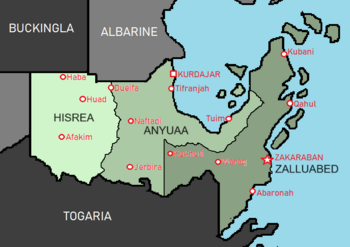 | |
| Capital | Zakaraban |
| Official languages | Zakarabani |
| Other languages | Zagha, Polaja |
| Demonym(s) | Zalluabedi |
| Government | |
• King | Farik al-Jamura |
| Husani Antar | |
| Nashat el-Yusuf | |
| Jirhanu Bjyala | |
| Population | |
• 2020 estimate | 31,588,000 |
| GDP (PPP) | estimate |
• Total | 106.04 billion |
| Date format | mm-dd-yyyy |
The Kingdom of Zalluabed, most commonly known as Zalluabed, is a nation located on the continent of Adula, bordered by Albarine, Anyuaa, Buckingla, Hisrea, Togaria, and Unified Sera. The country has a semi-arid geography, with most of the population of 31.6 million living in the fertile coastal regions, and sparsely populated desert mountains dominating the geography of the west. This arid geography makes the country very vulnerable to climate change. The capital and largest city, Zakaraban, is located in the east along the coast of the Emmiria Sea, and contains nearly 40% of the nation's population. Prior to the separation of Anyuaa and Hisrea, its major cities include Kurdajar, Tuim, Qahul, Huad, and Waraq.
Zalluabed has a long history of human settlement and civilization, with prominence as a coastal trading post for the Toyana Ocean as parts of the Quetanan and Emmirian empires. In the modern era, it has been known for major economic strides with the discovery of major oil fields, but its become known for political and social strife. In the World War, Zalluabed provided supplies to the League Powers. It joined the CCA in the 1990s, but has been repeatedly criticized for aggressive tactics in insuring its sovereign territorial claims and pursuing a nuclear program which was the subject of international sanctions. Recent events, like the Tarijar Strait Crisis and the Hisrea War, have also drawn scrutiny. The presidency of Zayyaan al-Akhtar was considered by the international community as being an authoritarian government, but the 2023 general election installed a more liberal-leaning government headed by Husani Antar. Antar's progressive policies and intention to leave the TTPA prompted the military to oust him in a coup under Saahir Salim, and a Zalluabed civil war broke out as a result. In July 2024, a peace deal settled fighting between Antar supporters and the government and resulted in the independence of Anyuaa.
Zalluabed has a semi-presidential constitutional monarchy, with local constituencies consisting of 38 provinces and 941 communes. Zalluabed is a regional and middle power. It has one of the highest of Human Development Index of all Southern Adulan countries and one of the largest economies on the region of the continent, based largely on energy exports. Zalluabed has the 16th largest oil reserves in the world and the tenth largest in Adula, while it has the eleventh-largest reserves of natural gas. Zonatrach, the national oil company, is one of the largest companies in Adula, supplying large amounts of natural gas to Euronian nations, specifically Drambenburg and Murzi. Zalluabed is a member of the Coalition of Crown Albatross, TTPA, CTO, and many other international organizations.
History
Prehistory
Human habitation of Zalluabed dates back to 50,000 years ago. Settlements and tools dating back to the Stone Age have been unearthed in the region. Artifacts originating from the Abaid period (c. 6500–3800 BC) have been discovered in abandoned coastal settlements. Al Ka'asa, a settlement located on the eastern coast, is the most important Abaid site in the country and is believed to have accommodated a small seasonal encampment.
Antiquity
The Achaiminid Empire (550–330 BC), founded by Cryun the Great, was the first true global superpower state and it ruled from as far north as Raviannas and as far south as Semalia, from their seat of power in Hazarabad (at the time known as Cryunias). The Achaiminid Empire conquered eastern Zalluabed in 402 BC, but within 50 years, it was pushed out of the country by unrest and rebellion.
Emmirian Empire
Zalluabed was described as a famous horse and camel breeding center during the Emayyad period. In the 8th century, it started benefiting from its commercially strategic position in the Emmiria Sea and went on to become a center of pearl trading. It became part of the Emmirian Empire in 820, at which point Islam spread to the region. Zalluabed was divided into caliphates, but as the Empire declined, so did the development of Zalluabed.
Modern Age
18th Century
The Al-Jamura dynasty was established with the ascension of King Jayaba al-Jamura in 1783.
19th Century
Zalluabed saw fighting in the Barretoan Wars, when Timerian and Durnstaal fleets engaged with Skithan forces off its coast.
20th Century
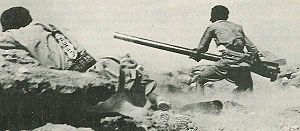
Oil reserves were first discovered in Zalluabed in 1929. Oil exports began in 1941, and oil revenues became the country's main source of revenue, the pearl trade having gone into decline. These revenues were used to fund the expansion and modernization of Zalluabed's infrastructure. Zonatrach, the country's main oil and gas company, was founded in 1963.
King Malik al-Jamura took the throne in 1932. Zalluabed's regime under King Malik al-Jamura supplied the League Powers of Drambenburg, Egilanak, and Styrae during the World War, and it was regarded as a tyrannical regime due to extrajudicial killings of political opponents and suspected international spies. King Malik often rallied the nation in nationalist attitudes against neighboring countries, specifically the secularized state of Albarine to the north and the formerly Islamic nation of Togaria to the south. Malik launched an invasion into Togaria to attempt and install a puppet government. However, Zalluabedi forces were repelled. The two-week long 1963 Ascacia War broke out in May of 1963 when King Malik tried to lay claim to off-shore oil fields, and the conflict drew international scrutiny.
King Malik died in 1966, and his son Isa al-Jamura became king. Isa led reforms, breaking up much of his father's authoritarian policies, and embracing a more liberal form of Islam. In 1980, he reformed the political process by instituting the National Assembly and the position of President of Zalluabed. Within the decade, the political power held by the King would essentially dissipate to a symbolic role. Furthermore, diplomatic reforms were made with Zalluabed drawing closer to the nations of Beleroskov, Drambenburg, and Yuan. King Isa backed the formation of the Coalition of Crown Albatross, and joined the organization with approval of the National Assembly in 1981.
Bariim al-Kaboula was elected President in 1997. On 6 March 1999, Farik al-Jamura became king when Isa died in a car crash while visiting Rhaga, Emmiria.
21st Century
In October of 2000, a Shia insurgency in Zalluabed began when dissident cleric Hussein al-Athi, head of the Hisrean Shia sect, launched an uprising against the government. The government alleged that the Hisrean rebels, known as the Hisrea People's Liberation Front (HPLF), were seeking to overthrow it and to implement Shī'ite religious law. The rebels counter that they are "defending their community against discrimination" and government aggression. The revolution was put down.
Abdelaziz Melkabaar was elected President in 2009.
Zayyaan al-Akhtar was elected President in 2017.
On November 25th, 2020, Albarine was at the center of the Tarijar Strait Crisis, which arose after Drambenburg was granted access to build military bases in Buckingla and Zalluabed. Against the move, which Albarine saw as an affront to the safety of international shipping in the waterway (which was required for Drambenburgian naval warships to traverse to Buckingla), Albarine condemned all three nations with the backing of Emmiria. Zalluabed, in response, closed their embassy and consulate in Albarine and sent a naval detachment to the outskirts of Albarine territorial waters as a show of force. Ultimately, threat of Coalition of Crown Albatross intervention and condemnation forced Zalluabed's navy to stand down. In December of 2020, the Hisrea People's Liberation Front (HPLF) seized many key towns and villages in the province of Hisrea, sparking President Zayyaan al-Akhtar's decision to send government forces into the province to combat them, beginning the Hisrea War. After the capture of Habu Daa on December 30th, the Zalluabed Army began major operations to clear the HPLF, which started resulting in major loss of civilian life.
In January 2021, Hisrea Province's First Minister Aikan Ayadmar of the Hisrea Nationalist Party (HNP) pledged to push through with a referendum on independence, regardless of whether he won election against al-Akhtar. President al-Akhtar was reelected to a second term in February of 2021, but despite his domestic popularity, international scrutiny surrounding the offensive ramped up, with Zamastanian Secretary of State Jessiah Vallotis calling it "a genocide in the making." After a Security Council resolution, Zalluabed government forces withdrew from Hisrea on April 19th, 2021. However, the HPLF rebounded and seized much of the province once again, and after an unsuccessful assassination attempt on President al-Akhtar by the HPLF, Zalluabedi forces with the backing of Beleroskov, Buckingla, and Kossmil began a new operation to push them back. Again facing international scrutiny, Drambenburgian observers were sent to mediate the conflict and ensure practical military conduct.
On July 15th, a Zalluabedi fighter jet accidentally fired on a Zamastanian naval vessel, the ZMS Monserrati, killing 21 sailors and drawing heavy scrutiny from the international community. On July 21st, Huad was captured by government forces, but the conflict began to stall. Four days later on the 25th, a string of suicide bombings committed by the HPLF struck Zakaraban, killing more than 80 people and causing damage to many international embassies. On August 8th, the government and the HPLF accepted an invitation by Timerian President Aneya Raso to a peace conference in Osea, where on August 13th they agreed to a power-sharing agreement, ending the conflict and separating Zalluabed into two distinct governed zones in the Osea Accords. Hisrea became largely autonomous as a result, and the Zalluabedi government leaned closer into reconciliation with the international community.
The presidency of Zayyaan al-Akhtar was considered by the international community as being an authoritarian government, but the 2023 general election installed a more liberal-leaning government headed by Husani Antar. Antar's progressive policies impressed much of the international community, as he became the first Zalluabedi head of state to visit Albarine, speak at the CCA General Assembly, and reopen diplomacy with Zamastan. However, Antar's intention to leave the TTPA prompted the military to oust him in a coup under General Saahir Salim, and a civil war broke out as a result. Salim and several other officials were assassinated in October 2023 as fighting intensified. As of mid 2024, the civil war is still ongoing with several factions, though an internationally-mandated ceasefire between the main belligerents and a CCA peacekeeping operation are in place.
Geography
Biodiversity
More than 330 species of birds were recorded in Zalluabed, 26 species of which breed in the country. Millions of migratory birds pass through the region in the winter and autumn months. One globally endangered species, Chlamydotis undulata, is a regular migrant in the autumn. The many islands and shallow seas of Zalluabed are globally important for the breeding of the Socotra cormorant; up to 100,000 pairs of these birds were recorded over the Kawar islands. Zalluabed's national bird is the bulbul while its national animal is the oryx. And the national flower of Zalluabed is the beloved Deena.
Only 18 species of mammals are found in Zalluabed, animals such as gazelles, desert rabbits and hedgehogs are common in the wild but the oryx was hunted to near-extinction. Twenty-five species of amphibians and reptiles were recorded as well as 21 species of butterflies and 307 species of flora. The marine biotopes are diverse and include extensive sea grass beds and mudflats, patchy coral reefs as well as offshore islands. Sea grass beds are important foraging grounds for some threatened species such as dugongs and the green turtle. In 2003, Zalluabed banned the capture of sea cows, marine turtles and dolphins within its territorial waters.
Demographics
Religion

Zalluabed is a predominantly Sunni Muslim country with Islam as its state religion. The percentage of adherents of various religions is a controversial topic in Zalluabed. An estimated 85–90% are identified as Muslim, 10–15% as Coptic Christians, and 1% as other Christian denominations, although without a census the numbers cannot be known. Other estimates put the Christian population as high as 15–20%. Non-denominational Muslims form roughly 12% of the population.
Zalluabed was a Christian country before the 7th century, and after Islam arrived, the country was gradually Islamised into a majority-Muslim country. It is not known when Muslims reached a majority variously estimated from c. 1000 CE to as late as the 14th century. Zalluabed emerged as a center of politics and culture in the Muslim world.
There is also a Shi'a minority, with more than 92% of Shi'as in the country living in Hisrea province.
Language
Cities
|
Metropolitan areas in Zalluabed | |||||
| No. | CMA City |
Population | |||
| 1 | Zakaraban | 2,915,811 | |||
| 2 | Kurdajar | 1,315,100 | |||
| 3 | Qahul | 821,000 | |||
| 4 | Tuim | 631,500 | |||
| 5 | Huad | 312,730 | |||
| 6 | Waraq | 287,155 | |||
| 7 | Kubani | 214,260 | |||
| 8 | Afakim | 178,000 | |||
| 9 | Abaronah | 153,800 | |||
| 10 | Naftadi | 102,637 | |||
Politics
Zalluabed is a constitutional monarchy headed by the King, Farik al-Jamura. King Jamura enjoys wide executive powers which include appointing the President of Zalluabed and his ministers, commanding the army, chairing the Higher Judicial Council, appointing the parliament's upper house and dissolving its elected lower house. The head of government is the President, currently vacant since the 2023 Zalluabed coup, the ouster of Husani Antar, and the assassinations of the coup masterminds Saahir Salim and Zayyaan al-Akhtar.
Zalluabed has a bicameral National Assembly consisting of the Zhura Council with 40 seats and the Council of Representatives with 40 seats. The forty members of the Zhura are appointed by the king. In the Council of Representatives, 40 members are elected by absolute majority vote in single-member constituencies to serve four-year terms. The appointed council "exercises a de facto veto" over the elected, because draft acts must be approved so they may pass into law. After approval, the king may ratify and issue the act or return it within six months to the National Assembly where it may only pass into law if approved by two thirds of both councils.
Provinces
Zalluabed consists of 9 provinces.
- Zakaraban
- Benel
- Gan
- Tuim
- Qahaza
- Kukhuti
- Taman
- Aboyal
- Hisrea
Military and Foreign Relations
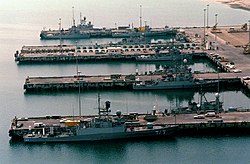
The kingdom has a moderate but well equipped military called the Royal Zalluabed Defense Forces (RZDF), numbering around 243,000 personnel. The RZDF consists of five branches; the Royal Zalluabed Army, the Royal Zalluabed Navy, the Royal Zalluabed Air Force, the Royal Zalluabed Marine Force, and the Royal Zalluabed Police Force. The supreme commander of the military is King al-Jamura and the deputy supreme commander is the Crown Prince, Hamad al-Jamura. The RZDF is primarily equipped with domestically built equipment, such as the IL5-Nightjar and IL9-Ibis, though in recent years they have procured Drambenburgian equipment.
Zalluabed is a member of the Coalition of Crown Albatross, and has established bilateral relations with 89 countries worldwide. As of 2012, Zalluabed maintains a network of 25 embassies and 3 consulates. It's closest allies are Buckingla and Drambenburg, the latter of which holds significant military presence within the country. Drambenburg holds military leases at two airports (one of which is at the capital of Zakaraban), and a naval base in the port of Zakaraban. During the Hisrea War, the foreign intervention of Drambenburg, Beleroskov, Kossmil, and Buckingla were important factors. Likewise, the military-government established after the 2023 Zalluabed coup relied heavily on TTPA coalition support in the ensuing civil war.
Human Rights
Zalluabed is often criticized for its human rights record, having very little freedom of religion and limits on freedom of the press. The CCA-Human Rights Watch has placed Zalluabed on its watch list of countries that require close monitoring due to the nature and extent of violations of religious freedom engaged in or tolerated by the government. According to a 2010 survey, 84% of Zalluabedis polled supported the death penalty for those who leave Islam; 77% supported whippings and cutting off of hands for theft and robbery; and 82% support stoning a person who commits adultery.
Christians face discrimination at multiple levels of the government, ranging from underrepresentation in government ministries to laws that limit their ability to build or repair churches. Intolerance towards followers of non-orthodox Muslim sects, such as Sufis, Shi'a and Ahmadis, also remains a problem.
Protests are regularly put down with force, and Zalluabed actively practices capital punishment. Zalluabed's authorities do not release figures on death sentences and executions, despite repeated requests over the years by human rights organizations.
Homosexuality is illegal in Zalluabed.
Culture
Art
Literature
Cuisine
Economy
Resources
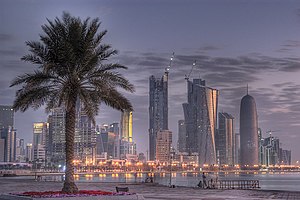
Economic conditions have fluctuated with the changing price of oil since 1985. With its highly developed communication and transport facilities, Zalluabed is home to a number of multinational firms and construction proceeds on several major industrial projects. A large share of exports consist of petroleum products made from imported crude oil, which accounted for 44% of the country's imports in 2019. Hisrea province in the west produces more than 80% of the nation's oil production, with the vital Hisdema oil pipeline running to refineries across Zalluabed and Buckingla.
Zalluabed depends heavily on food imports to feed its growing population; it relies heavily on meat imports from Buckingla and Emmiria and also imports 75% of its total fruit consumption needs.
Mining is another major industry in the country, with large gold, kaolin, salt, phosphate, and limestone deposits.
Energy
Zalluabed runs largely on natural gas and coal facilities, with those sectors consisting of more than 72% of the energy grid. A Drambenburgian-constructed nuclear power plant in Tuim provides about 12% of the nation's power supply.

